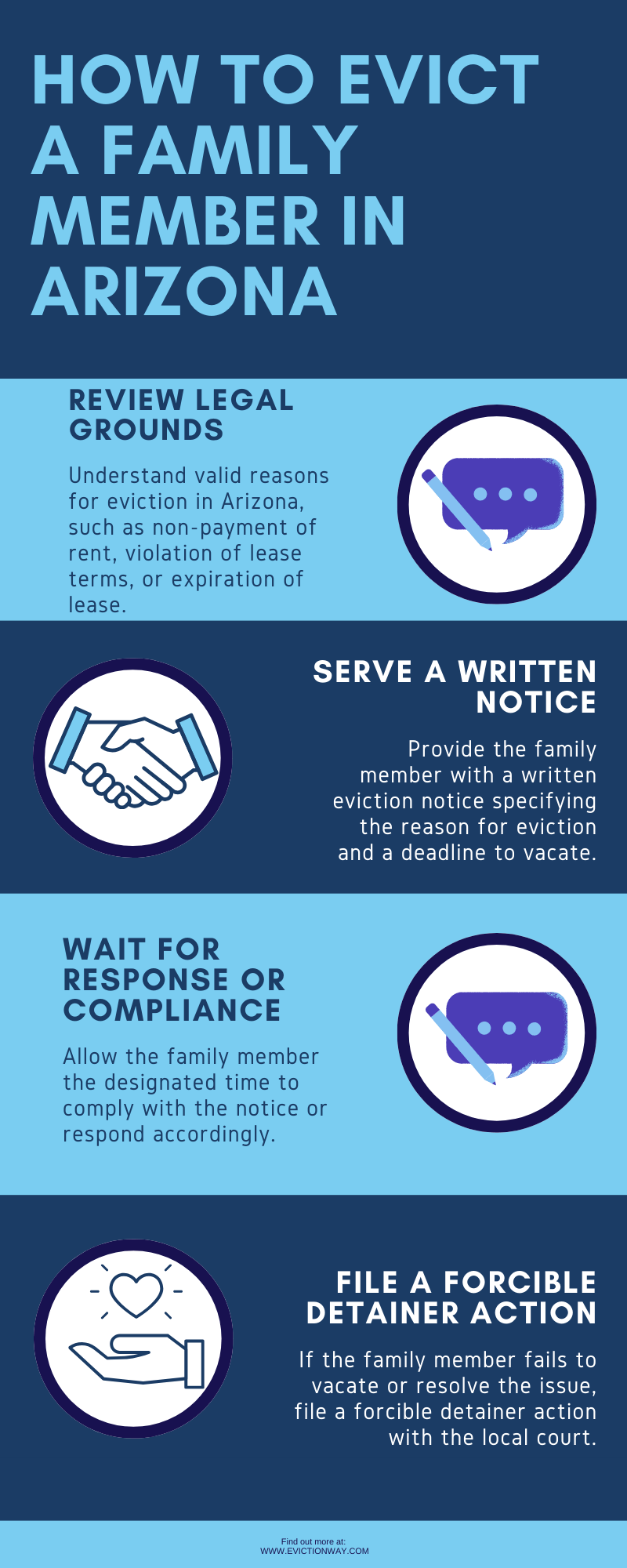If you’re facing the difficult situation of needing to evict a family member in Arizona, this blog article is here to guide you through the process. We’ll share the best way to evict a family member in Arizona, and provide you with the method to evict them.
Evicting a family member can be a sensitive and challenging process, but it’s important to remember that you have rights as a homeowner or landlord. We’ll provide tips on removing a family member politely, and discuss the laws involved in the eviction process.

We’ll also share legal tips to help you navigate the complexities of evicting a family member. Whether you’re dealing with a difficult tenant or a family member who has overstayed their welcome, this article will provide you with the information you need to proceed legally and respectfully.
How To Evict a Family Member In Arizona
Evicting a family member can be a difficult and emotional process. However, it is important to remember that you have the right to protect your property and your family.
1. Document the Situation
The first step in evicting a family member is to document the situation. This includes keeping a record of any incidents of violence, threats, or property damage. You should also keep a record of any attempts you have made to resolve the situation.
2. Give Notice
Once you have documented the situation, you need to give your family member notice that they must leave. The notice period will vary depending on the circumstances, but it is typically 30 days.
3. File for Eviction
If your family member does not leave after the notice period has expired, you will need to file for eviction. This can be done through the court system.

4. Attend the Eviction Hearing
Once you have filed for eviction, you will need to attend the eviction hearing. At the hearing, you will present your evidence to the judge. The judge will then make a decision about whether or not to evict your family member.
5. Enforce the Eviction Order
If the judge orders your family member to be evicted, you will need to enforce the eviction order. This can be done by hiring a sheriff or constable to remove your family member from the property.
6. Get Help
If you are having difficulty evicting a family member, you should seek help from an attorney. An attorney can help you with the legal process and can provide you with support.
Additional Resources for Arizona eviction help:
30 day eviction notice Arizona
In Arizona, a 30-day eviction notice indeed serves as a legal document that landlords can utilize when tenants breach their lease agreements.
This notice essentially notifies tenants that they have thirty days to rectify the violation or vacate the premises. It’s a crucial step in the eviction process and provides tenants with a final opportunity to resolve the issue before further legal action is taken.
You can download 30 day eviction notice Arizona here.
How Much Does it Cost to Evict a Family Member in Arizona?
Evicting a family member can be a difficult and expensive process. The cost of eviction will vary depending on the circumstances of the case, but it can easily exceed $1,000. In addition to the court costs, you may also have to pay for attorney’s fees, process server fees, and other expenses.
| Expense Category | Estimated Cost Range |
|---|---|
| Filing Fee | $50 – $150 |
| Process Server Fee | $35 – $100 |
| Legal Notice Posting Fee | $10 – $50 |
| Attorney Fees | $500 – $1,000+ |
| Court Appearance Fee | Varies by county |
| Lost Rent | Varies |
| Property Damage Repairs | Varies |
If you are considering evicting a family member, it is important to weigh the costs and benefits carefully. Eviction can be a traumatic experience for everyone involved, and it is important to make sure that it is the right decision for you and your family.

FAQs: Evicting a Family Member in Arizona
Here are some of the most asked questions.
What are the grounds for evicting a family member in Arizona?
In Arizona, you can evict a family member if they have violated the terms of their tenancy, such as not paying rent or breaking the lease. You can also evict a family member if they are causing damage to the property or posing a threat to the health or safety of others.
How do I start the eviction process?
To start the eviction process, you must give your family member a written notice to vacate the property. The notice must state the reason for the eviction and the date by which the family member must leave. If your family member does not leave by the deadline, you can file a complaint with the court.
How to evict a family member with no lease in arizona?
Evicting a family member in Arizona when there’s no lease can be a delicate and legally complex matter.
Here are some general steps of the process:
- provide written Notice
- File for Eviction
- Attend the Eviction Hearing
What happens if my family member refuses to leave?
If your family member refuses to leave after you have given them a notice to vacate, you can file a complaint with the court. The court will then hold a hearing to determine whether or not your family member has violated the terms of their tenancy. If the court finds that your family member has violated the terms of their tenancy, the court will issue an eviction order.

How long does the eviction process take?
The eviction process can take several weeks or even months, depending on the circumstances. If your family member contests the eviction, the process may take longer.
What are my rights as a landlord?
As a landlord, you have the right to evict a family member who has violated the terms of their tenancy. You also have the right to collect rent and to have the property maintained in good condition.
Related:

How long does it take to get an eviction notice in the state of Arizona?
Specifically in Arizona, an eviction notice is usually a 5-30 days “notice to comply or vacate.” depending on the reason for eviction and the type of lease agreement.